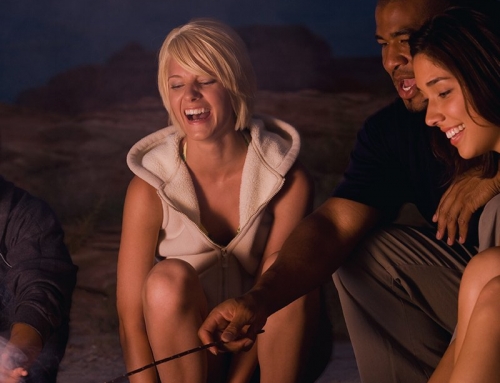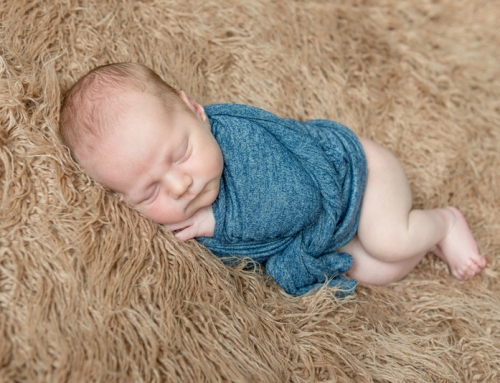The human’s betrayal of God in the Garden of Eden had led God to quickly eject Adam and Eve from the Garden and from his presence. As the first man, Adam, had been given the responsibility to represent all of humanity, and so Adam’s choice to betray God had massive implications for all humans. Adam’s choice implicated all of his children and grandchildren – in fact, every man, woman and child who came after him – in his rebellion against God and all the consequences of that rebellion. And the consequences were grave.
Adam had been the image-bearer of God but once he and his wife followed Satan into betrayal, it was as if they had taken up a banner for God’s Enemy. They bore the brand of Satan and because Adam represented humanity, each child born thereafter would be born branded as God’s enemy and locked in slavery to selfishness and sin.
And so each child given life by Eve would have the natural inclination to oppose God and worship and serve the creation rather than the Creator God. The aspect of creation Adam and Eve’s offspring most adored was, of course, themselves. But they also worshipped the natural world around them, their possessions, their food, the animals, their bodies, their relationships, and the earth itself. Pretty much everything good God had given them as gifts became an avenue for their rebellion, a tool for their pleasure and self-fulfillment, they misused and abused the good things of God rather than using them as intended, an instrument of praise to God.
As Adam and Eve, and each human after them, placed self-love at the center of their existence, they pushed God and his desires and his will further and further to the margins of their lives. They became increasingly opposed to the influence of God in their lives. Their inclination to focus on self, made relating to each other difficult and painful and human suffering became the norm.
Satan was pleased with the chaos and brokenness he had brought into the world and he continued to work to keep each and every human under his control. Nevertheless, God did not cede control of humanity over to Satan. He had promised that Satan would be nipping at humanity’s heels but that one day a man would be born who would crush Satan and all he represented.
Though death had entered the earth with great fury, God would continue to speak and influence, beating back the will of Satan and acting with faithfulness toward his creation. In the human world there were stories; stories of how things had been, how Adam and Eve had betrayed God but how good life had been in God’s presence. They knew the curses and promises God had pronounced over their lives and they explained them to their children, reminding them why they suffered as they did.
One of Adam and Eve’s sons was named Abel. Despite the growing chaos around him – perhaps because of it – Abel made a practice of honoring God through sacrifice. His parents had been covered by the blood sacrifice of an animal and rescued from immediate death. Abel understood that it pleased God to receive blood sacrifices as a covering for sin, so when it came time to honor God, he chose to take some of the best lambs from his flock and sacrifice them as a peace offering to God.
God was very pleased with Abel’s sacrifice.
For another son of Adam and Eve, Cain, things were different. Cain observed that Abel made a sacrifice to God from his belongings and so he also brought an offering to God. But the intention of Cain’s heart was not to obey or honor God. He either misunderstood or ignored God’s instruction that a blood sacrifice was needed to take away the guilt and shame of his sins and the innate enmity with God that his father, Adam, has passed on to him.
To a large degree, Cain’s sacrifice became a tool to honor himself in God’s presence – to try to force God to bless his life by doing something he perceived as good. He didn’t realize his efforts could not cover the weight of the wrongdoing he had done himself, let alone the guilt and shame passed on to him by Adam.
Cain arrogantly brought an offering of produce. No blood sacrifice. He was convinced God would be pleased anyway. But God rejected Cain’s gift.
Cain had no change of heart, no repentance. Instead, he burned with anger and resentment toward God. He was filled with jealousy toward his brother Abel whose sacrifice was accepted.
God came to Cain and asked him, “Why are you so angry and discouraged? Won’t you be accepted if you do the right thing?” But Cain seemed to ignore God making no response.
God continued. “You know, Cain, if you continue down this path and you refuse to do what’s right, you should beware! Evil is crouching at your door, waiting to destroy you. You must not allow it to control you.”
But Cain continued to be obstinate toward God and gave him no answer. Instead Cain went and found his brother, Abel. Cain suggested to his brother, “Abel, let’s go out into my field together. I have a project there I am excited to show you.” Abel went along innocently, not realizing that Cain intended to ambush him. Once alone in the fields, Cain angrily attacked his brother, overpowered him and killed him.
Some time later, God returned to Cain. He asked, “Cain, where is your brother, Abel?”
“I don’t know!” Cain replied. “Am I my brother’s keeper?”
God said, “What have you done? Can’t you hear it? Listen, your brother’s blood cries out to me from the ground! You will now be under a curse. You’ll have to leave this place and no longer work the ground that you have soiled with your brother’s blood. For this reason, it will no longer produce crops for you, no matter how hard you work! From now on you will be a nomad, on the run, constantly wandering from place to place.”
Seemingly with no remorse, Cain responded, “My punishment is more than I can bear! You have removed me from my land … and now you want me to leave your presence and the company of my family? You have made me a wanderer. I’ll always be on the run. When people see me they will try to kill me!”
God replied, “No! They will not kill you. Anyone who tries to hurt you will receive seven times your punishment.” Even in the case of rebellious and murderous Cain, God showed mercy. He didn’t leave Cain to fend for himself but put a mark on Cain that somehow alerted anyone of the cost should Cain’s life be taken. Indeed, Cain lived for many, many years and spawned a nation of evildoers; each generation was more hateful of God and his ways than the one before.
After this Adam and Eve conceived another son; and she named him Seth, the word for “compensation,” because, as she said, “God has replaced my son Abel who Cain killed.”
This Story is a paraphrase. Details & references found in Genesis 1-3; Romans 5:12-21; 1 Corinthians 15:21-22, 45-49; John 8:44
Introduction to The Story – Before There Was Time
Before there was humanity and before there was time, before anything of
Story 1 – Perfect Peace
In the beginning was God. God is a spiritual being and is not bound by space
Story 2: The Rise Of Self
God placed the man and woman in the beautiful garden, Eden. They enjoyed harmony with each
Story 3: Murder, Chaos & Destruction
The human’s betrayal of God in the Garden of Eden had led God to quickly eject
Story 4: A Merciful New Start
Seth’s family and Cain’s family lived very different lives. Seth’s offspring were raised to have a
Story 5: A Family for God
After the flood had receded, God instructed Noah and his family to go and fill the
Story 6: A Family Preserved
Favoritism Creates Enemies As the twin boys grew, Esau became Isaac’s dream son – strong, courageous
Story 7: A Nation for God
Long before Jacob came with his family to Egypt, he met God in a time of
Story 7A – The gods of Egypt
These are some of the major gods the Egyptians revered and all the signs Yahweh brought
Story 8: A New Betrayal
At midnight, YHWH struck down all the firstborn of Egypt. No Egyptian household escaped the plague.
Story 9: Faithlessness and Judgment
Just before giving Moses the tablets of stone on Mt. Sinai, YHWH instituted a weekly day






